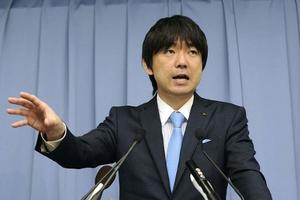Nuclear powerJapan considers referendum to end nuclear power
Lawmakers in Osaka, Japan are currently mulling over whether to abandon nuclear power all together following the catastrophic nuclear accident at the Fukushima Daiichi atomic energy plant

Osaka mayor Toru Hashimoto addresses call for nuclear referendum // Source: laodong.com.vn
Lawmakers in Osaka, Japan are currently mulling over whether to abandon nuclear power all together following the catastrophic nuclear accident at the Fukushima Daiichi atomic energy plant.
On Tuesday a group of activists submitted a petition seeking a referendum to end nuclear energy. The petition comes as part of a broader campaign against nuclear power that gained steam in the wake of the accident at the Fukushima Daiichi plant.
Prior to the 11 March earthquake and tsunami that triggered the nuclear meltdown at Fukushima, the Japanese government had planned to boost atomic energy production so that it would supply 50 percent of the country’s energy needs by 2030, up from the current 30 percent. However, intense opposition and large protests against nuclear power as well as increasing scrutiny of the country’s nuclear regulators forced lawmakers to abandon their plans.
According to the Christian Science Monitor, referendums are rare in Japan and there is no law for a national referendum, but anti-nuclear activists hope the latest petition will re-ignite the flagging campaign against atomic energy. Local assemblies are allowed to hold referendums, so campaigners in Osaka, Tokyo, and the western prefecture of Shizouka have set about pressuring their leaders.
In Osaka City, anti-nuclear groups were able to gather 55,430 residents’ signatures or 2.1 percent of the city’s population, just above the minimum 2 percent needed for a petition. Activists hope Osaka, Japan’s second-largest metropolitan area with 2.7 million residents, will stop receiving its power from Kansai Electric, which operates eleven nuclear reactors at three plants near the city.
“Deciding such an important issue should be in the hands of the voters,” said Hajime Imai, an organizer of the petition, to the CS Monitor.
The fate of the referendum is now in the hands of Osaka Mayor Toru Hashimoto, who must introduce a motion to the city assembly for a vote on whether or not to hold the plebiscite.
Hashimoto is an ally of the anti-nuclear cause and has expressed his desire to reduce the city’s dependence on nuclear power, but has shown little enthusiasm for a costly referendum.
According to Imai, the Osaka assembly is largely divided on the nuclear issue. The anti-nuclear side has won three referendums held on the issue, but the votes have little impact on national policies. Imai still remains hopeful that similar votes across the country will send a signal to national lawmakers.
In addition, Imai’s group is collecting signatures for a national referendum, but since there is no Japanese law about such a thing, Parliament would first have to pass a law ordering a national vote.
Polls indicate that roughly 75 percent of Japan is in favor of gradually moving away from nuclear power, but in the year since the Fukushima Daichii disaster the initial outpouring of criticism and activism has waned.
“Our biggest enemy has been apathy,” Imai said in an interview with Reuters.
